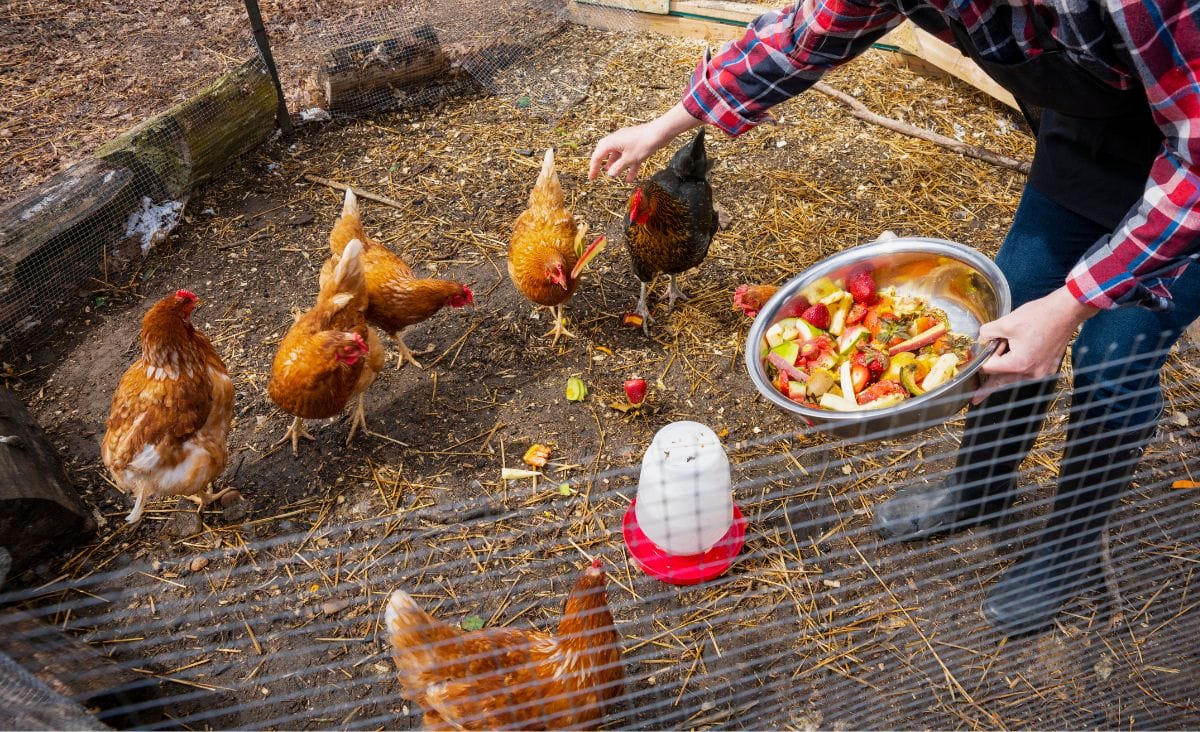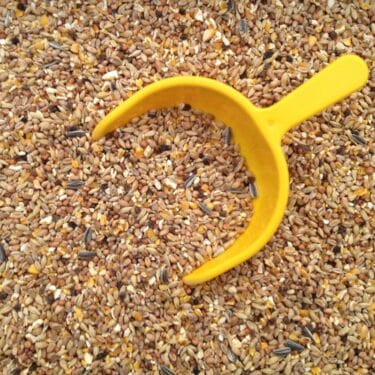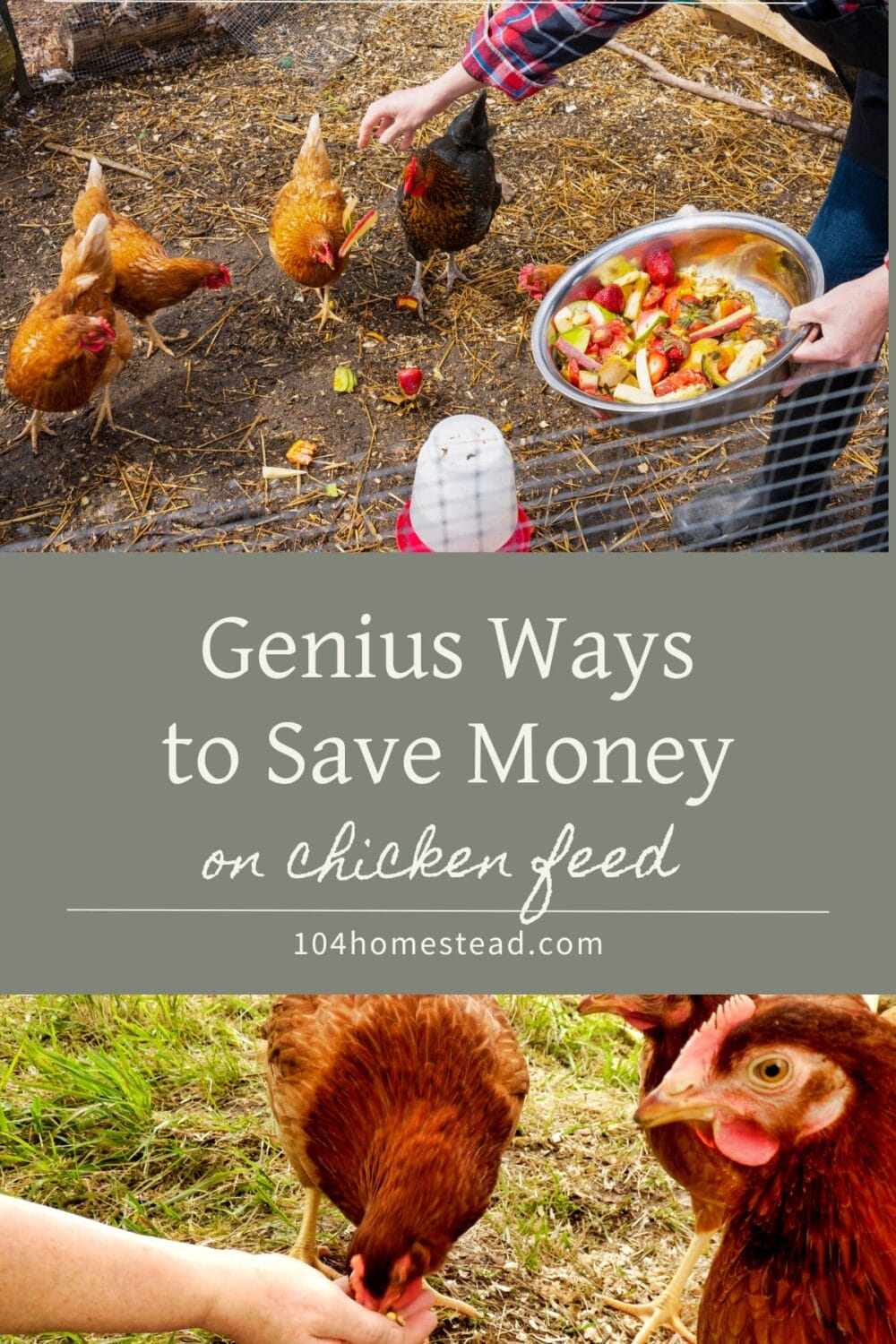11 Genius Ways to Save Money on Chicken Feed
Discover chicken feed cost-cutting tips! Learn how to grow fodder, forage for free range, shop for deals, and more.

Looking to stretch your budget while still providing top-notch nutrition for your feathered friends? You’re in the right place!
I am going to show you some smart ways to save money on chicken feed without sacrificing quality. Whether you’re a seasoned poultry keeper or just starting out, these tips will help you feed your flock affordably and sustainably.
1. Grow Your Own Fodder
By growing your own fodder crops like sunflower sprouts, wheatgrass, or barley, you can give your chickens healthy greens for a lot less money than buying feed from a store.
Sprouted barley, in particular, is a fantastic option for homesteaders seeking an affordable and sustainable way to supplement their flock’s diet. You can grow nutritious barley sprouts that your chickens will love with very little space and supplies. Check out my post on sprouted barley fodder to learn how to get started.
2. Forage for Free Range
They can eat grass, bugs, and other natural foods if you let your chickens free range. This not only supplements their diet but also promotes exercise and mental stimulation.
Not sure what plants are safe for your flock to nibble on? All people who keep chickens in their yards should read my guide on plants that are safe for chickens. Learn how to make a foraging paradise for your birds while still making sure they are safe and healthy.
Free-ranging can be good for both chickens and the people who take care of them in many ways, from giving them access to healthy greens to naturally getting rid of pests.
3. Supplement with Table Scraps
Don’t let kitchen scraps go to waste – turn them into tasty treats for your chickens! My post about composting with chickens talks about all the great reasons to feed your chickens food scraps. Find out what food scraps are safe and good for chickens to eat, and how composting with chickens can help you get rid of waste and make your garden soil better.
Food scraps like eggshells, fruit peels, and leftover vegetables will be delicious to your chickens, and they will also help you make compost that is good for your garden.
4. Bulk Purchase Feed
If you want to keep your chicken costs down, buying feed in bulk can make all the difference. There are often big price drops per pound or per bag when you buy a lot of feed. It is also more convenient and gives you peace of mind because you know you will always have a steady supply on hand.
One smart way to get the most out of these savings is to form a cooperative with other chicken lovers in your area. By working together and buying in bulk, co-op members can get even better deals from suppliers, which means that everyone can save money while still getting high-quality feed for their flocks.
5. Shop Around for Deals
When you buy feed, knowing about upcoming sales events or seasonal deals can help you plan your purchases in a way that saves you the most money. Stocking up during sales not only gets you feed at a lower price per pound, but it also makes sure you have enough for the next few weeks or months.
Also, you might want to join the newsletters or loyalty programs that your favorite suppliers offer to get special deals and offers.
6. Mix Your Own Feed
Getting into custom feed blends is a great way for chicken lovers to improve the nutrition of their flock while not spending too much. Utilizing grains, seeds, and supplements that are grown locally, you can create custom feed recipes that will meet the dietary needs and preferences of your chickens.
Also, getting ingredients from nearby farms helps communities stay strong while also having less of an effect on the environment. This helpful guide to homemade chicken feed recipes can help you get started on this rewarding journey.
7. Supplement with Inexpensive Protein Sources
Look into alternative protein sources to find a wide range of ways to improve your flock’s diet while also lowering your feed costs. Some protein-rich treats that can go well with commercial feed are mealworms, black soldier fly larvae, or even cooked eggs from your own flock.
These treats are full of nutrients and will help your chickens get the protein they need while also decreasing the amount of money you spend on feed. Also, giving your chickens these unusual but very healthy foods can improve their health and well-being as a whole, helping them grow strong, have beautiful feathers, and lay lots of eggs.

High-Fat, High-Protein Chicken Scratch Recipe
This post may contain paid links. If you make a purchase using the links in this recipe, I may earn a commission.
Equipment
- 1 Airtight Container
Ingredients
- 2 c. Whole Corn
- 1 c. Sunflower Seeds
- 1 c. Dried Mealworms
- ½ c. Flaxseeds
- ½ c. Pumpkin Seeds unsalted
- ¼ c. Peanuts unsalted
- ¼ c. Chia Seeds
Instructions
- In a large mixing bowl, combine the whole corn, sunflower seeds, dried mealworms, flaxseeds, pumpkin seeds, peanuts, and chia seeds.2 c. Whole Corn, 1 c. Sunflower Seeds, 1 c. Dried Mealworms, 1/2 c. Flaxseeds, 1/2 c. Pumpkin Seeds, 1/4 c. Peanuts, 1/4 c. Chia Seeds
- Mix the ingredients thoroughly, ensuring an even distribution of each component.
- Store the high-fat, high-protein chicken scratch in an airtight container in a cool, dry place.
- Offer this nutrient-rich mix to your backyard chickens as a supplement to their regular feed.
Notes
8. Consider Fermented Feed
It is possible to make chicken feed more nutritious and easier for chickens to digest by letting it ferment. Fermenting feed can also make it last longer, so you can feed less and still give your animals the nutrition they need.
In my post about fermenting chicken feed, I give you step-by-step instructions, tips, and advice on how to fix problems so that you can get the most out of fermentation. Learn how to ferment different grains, seeds, and supplements to make a tasty and healthy meal for your birds. You will save money on feed costs and improve your flock’s health, one tasty fermented bite at a time.
Tip: When fermenting chicken feed, start small and gradually increase the amount as your chickens become accustomed to the new feed. This helps prevent any digestive upset.
9. Utilize Garden Waste
By using garden waste as extra food for your chickens, you can reduce waste and naturally improve their health at the same time. Instead of throwing away garden waste like weeds, garden trimmings, and old crops, you could feed them to your birds as healthy treats. Many garden plants, herbs, and flowers boast beneficial properties that can support your chickens’ well-being, from boosting immunity to promoting digestive health.
Learn about the healing powers of different plants in my post on herbal remedies and natural supplements for chickens. This will help you use nature’s power to keep your chickens happy and healthy.
10. Efficient Feeding Practices
To cut down on feed waste, use feeders that are made to stop spills and food from going bad. We use gravity ports and install them in big rolling trash cans so they can easily be moved around. The large capacity means we aren’t filling them all the time.
11. Source Local Ingredients
Looking for local sources for feed ingredients like grains, seeds, and supplements can be good for both your flock and the community as a whole. By using nearby resources instead of those that have to be shipped long distances, you can help local farmers and suppliers and boost the agricultural economy in your area.
Also, buying locally often means getting fresher, better-quality ingredients, which will make sure that your chickens get the best nutrition possible.
Commonly Asked Questions About Saving Money on Chicken Feed
If you’ve found value in this blog post and enjoyed reading it, why not share it with your Pinterest community? Pin the image below and spread the love!

With these savvy strategies, you can slash your chicken feed expenses without compromising on quality or nutrition. From growing your own greens to sourcing local ingredients, there are plenty of ways to feed your flock affordably and sustainably. Get ready to save money while keeping your chickens healthy and happy!
What’s your favorite cost-saving tip for feeding your chickens? I’d love to hear your insights and experiences in the comments below!

